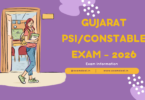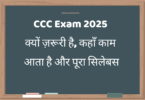UPSC Exam Trends: Understanding the Changing Landscape
The Union Public Service Commission (UPSC) examination is one of the most prestigious and competitive exams in India. It determines entry into the Indian Administrative Services (IAS), Indian Police Services (IPS), Indian Foreign Services (IFS), and other central government roles. With the dynamic nature of governance, societal needs, and global influences, the trends in the UPSC exam also evolve. Understanding these trends is crucial for aspirants to align their preparation strategies effectively.
Introduction: The Significance of Staying Updated
The UPSC syllabus and question patterns often reflect the changing priorities of the nation, including socio-economic challenges, technological advancements, and international developments. This blog dives into the evolving trends in the UPSC examination, providing insights that can help aspirants better prepare for upcoming challenges.
1. Increasing Weightage of Current Affairs
•Trend Overview
Over the past decade, the importance of current affairs in both Prelims and Mains has significantly increased. Topics are often drawn from contemporary events in national and international domains.
•Impact on Preparation
•Focus on daily news analysis from reliable sources like The Hindu, Indian Express, and PIB.
•Emphasis on understanding the underlying issues behind headlines rather than rote memorization.
•Examples of Questions
•Questions linking current events to historical, geographical, or economic contexts.
•Eg: Impact of India’s G20 presidency on global climate policies.
2. Shift Towards Analytical and Application-Based Questions
•Trend Overview
Questions in the Prelims and Mains increasingly test the candidate’s analytical skills rather than direct factual knowledge.
•Examples
•Prelims: Assertion-Reason and situational judgment questions.
•Mains: Questions like “Evaluate the role of cooperative federalism in disaster management with recent examples.”
•Preparation Strategy
•Develop a conceptual understanding of subjects.
•Regularly practice case studies and answer-writing exercises.
3. Emerging Importance of Technology and Environment
•Trend Overview
With global focus on climate change and technological disruptions, UPSC places significant emphasis on topics like renewable energy, sustainable development, artificial intelligence, and cybersecurity.
•Preparation Strategy
•Follow reports like IPCC (Intergovernmental Panel on Climate Change).
•Study government schemes like Digital India, Green India Mission, etc.
•Analyze questions such as: “How can AI transform governance in India?”
4. Interdisciplinary Nature of Questions
•Trend Overview
UPSC now integrates subjects like geography, economics, and science with governance and public administration.
•Examples
•“Discuss the role of the monsoon in shaping India’s agrarian economy.”
•“Analyze how demographic changes influence urban planning in India.”
•Preparation Strategy
•Combine knowledge from multiple sources.
•Relate static subjects to dynamic, real-world scenarios.
5. Role of Ethics and Integrity
•Trend Overview
The General Studies Paper IV on Ethics, Integrity, and Aptitude has evolved to include practical case studies, reflecting real-life governance challenges.
•Examples of Trends
•Case studies with dilemmas like corruption, transparency, and resource allocation.
•Emphasis on personal values and administrative ethics.
•Preparation Strategy
•Develop frameworks for answering ethical dilemmas.
•Practice writing answers with examples from leaders and philosophers.
6. Changing Nature of Optional Subjects
•Trend Overview
While popular optional subjects like Public Administration and Geography remain dominant, newer trends show increasing interest in subjects like Anthropology and Sociology due to their overlap with General Studies.
•Preparation Strategy
•Choose an optional subject based on interest, overlap, and scoring trends.
•Stay updated on scoring patterns and syllabus modifications.
7. Digital Resources and Online Preparation
•Trend Overview
With the rise of online platforms, digital learning has become a critical tool for UPSC preparation.
•Platforms like Unacademy, BYJU’s, and Vision IAS offer lectures, test series, and study material.
•Social media platforms for peer learning and expert advice.
•Pros and Cons
•Pros: Accessibility, cost-effectiveness, and interactive learning.
•Cons: Over-reliance on digital resources can lead to information overload.
8. Language Inclusivity and Regional Aspirants
•Trend Overview
The UPSC is making efforts to cater to aspirants from diverse linguistic and regional backgrounds, with question papers available in multiple languages.
•Preparation Strategy
•Practice writing answers in the chosen language medium.
•Use regional newspapers and magazines for content in local languages.
9. Increasing Focus on Government Policies and Schemes
•Trend Overview
Understanding flagship government schemes and their implementation has become indispensable.
•Examples
•Schemes like PM Gati Shakti, Atmanirbhar Bharat, and Ayushman Bharat.
•Questions like: “Critically analyze the impact of Ayushman Bharat on healthcare accessibility in India.”
•Preparation Strategy
•Regularly review the budget, Economic Survey, and PIB releases.
•Create concise notes on schemes and policies.
10. Mental Health and Wellness in Exam Preparation
•Trend Overview
UPSC preparation is demanding, often leading to stress and burnout among aspirants.
•Rise in awareness about the importance of mental well-being.
•Institutions now include motivational sessions and counseling.
•Preparation Strategy
•Incorporate breaks and physical activities into study schedules.
•Seek support from peers, mentors, or professionals when needed.
Conclusion: Adapting to Evolving Trends
The UPSC examination continues to challenge aspirants with its ever-evolving trends, demanding a blend of intellectual rigor, adaptability, and perseverance. Staying updated with these trends not only enhances the quality of preparation but also boosts confidence in tackling the examination. By embracing both traditional methods and modern tools, aspirants can effectively navigate the complexities of the UPSC journey and achieve their aspirations.
Let me know if you’d like an expanded version or focus on specific areas!







